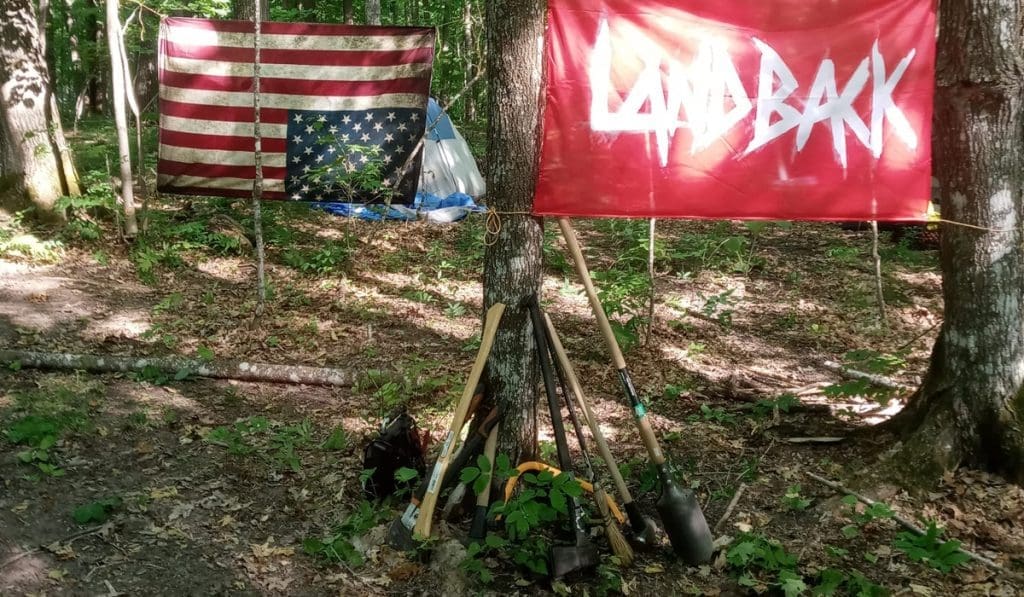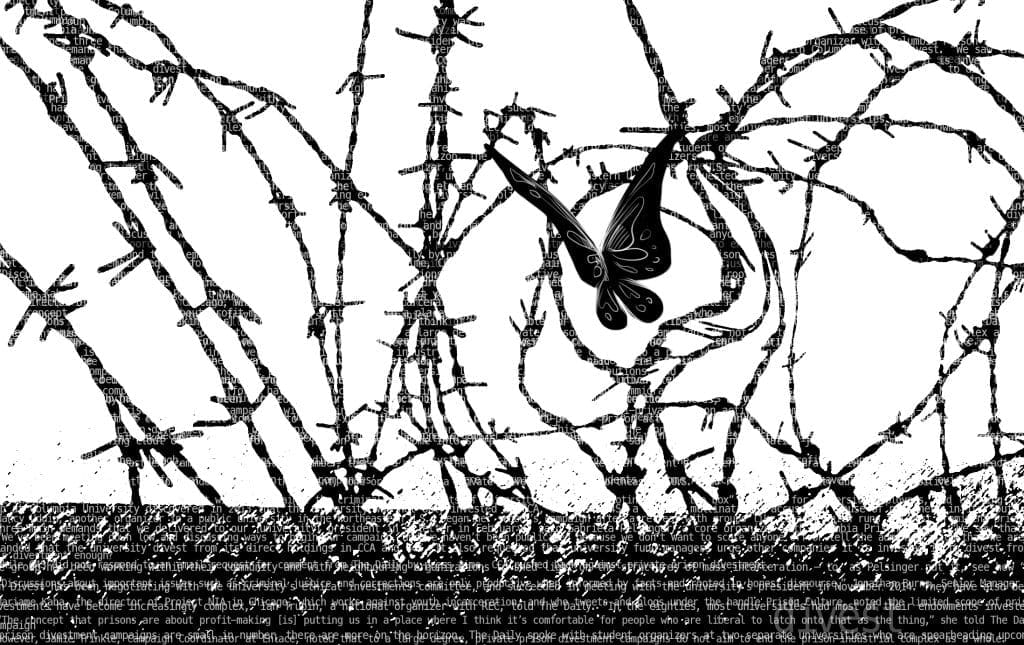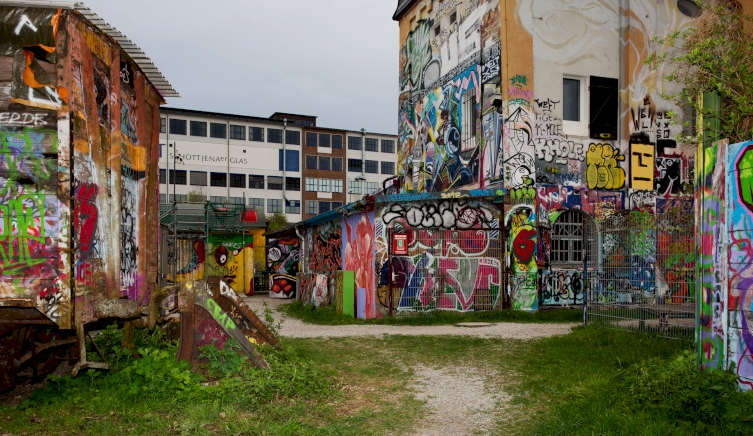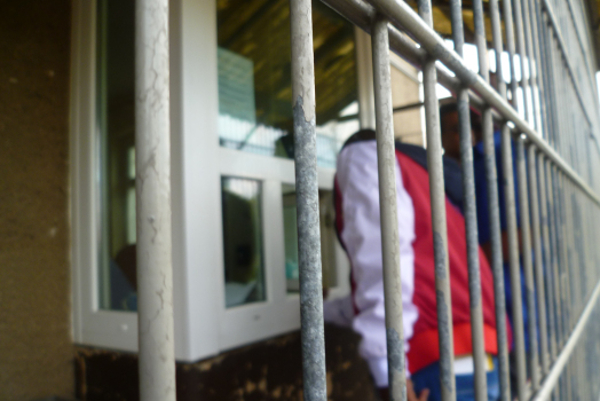Transcribed from the 23 January 2020 episode of This is Hell! Radio (Chicago) and printed with permission. Edited for space and readability. Listen to the whole interview:
There’s another thing we don’t talk a lot about, which is colonialism—and the way Indigenous communities have often been fighting against the US government for a very, very long time.
Chuck Mertz: Our world is collapsing around us due to climate change, and we’re going to have to do something about it. But what? Nobody’s ever experienced anything like this before, so we’re headed into uncharted waters when it comes to things like extreme sea level rise. But what if within the United States there were people who have experienced this before in their own way? Might they be able to point us to a better future?
Here to help us answer those questions, sociologist Kari Marie Norgaard is author of Salmon and Acorns Feed Our People: Colonialism, Nature, and Social Action. Kari is associate professor of sociology and environmental studies at the University of Oregon, and she is a past recipient of the Pacific Sociological Association’s distinguished practice award.
Welcome to This is Hell!, Kari.
Kari Marie Norgaard: Good morning, thanks for having me.
CM: Thanks for being on.
You write, “To the people who live there, the Klamath Basin, which stretches from northern California to southern Oregon, is their center of the world. It’s not hard to see why. Despite its remoteness, the region has been a touchstone for landmark environmental policies, not the least of which is the current process for the removal of the Klamath river dams.”
Why, despite its remoteness, has this region been a touchstone for landmark environmental policy? Plenty of other remote areas have a wealth of Indigenous cultural knowledge and ingenuity existing alongside intense disenfranchisement, poverty, substance abuse, domestic violence…so why the Klamath Basin, when it comes to being a touchstone for landmark environmental policies?
KN: There are all kinds of places from which something magic continues to radiate, and places that have strong landscapes with lots of things that are intact, ecologically and culturally. For me, and for those of us very far away from Chicago in the Pacific Northwest, this is a really important place. But certainly there are others.
This is a place where it’s two hours from the nearest stoplight. Many people don’t think about California as having these kinds of remote areas where lots of people are still getting a percentage of their food from hunting, fishing, and gathering. It’s a place that has been leading the way. Just about a year from now, the largest dam removal effort the world has ever had, at least in peacetime, should be starting.
It’s a place where, when it comes to climate change, there are wonderful positive things emerging, directions we can move forward—especially around fire.
CM: Why the removal of the dams? And why were the dams put there in the first place? The answer to one of those questions might reveal the answer to the other. Why were the dams put there in the first place, and why have people changed their minds and believe they need to be removed?
KN: In the US we had an era of dam building in the fifties, sixties, and seventies, and we see that happening around the world, too. Other places are still building large dams. But large dams have all kinds of ecological problems, social problems, human rights problems. While they are a source, in many cases, of significant amounts of energy—like the dams on the Columbia river—these dams [on the Klamath] are not that. The California Energy Commission has ruled that they produce a pretty negligible amount of energy. And yet the human rights and social and economic impacts are so great. That’s why they’re pointing towards removal at this time.
Connected are the ideas that we’ve had about how to manage the natural world. With climate change, we’re seeing that they haven’t worked—or that they’ve worked for very few people but created lots of social and ecological problems for the majority of us.
CM: People might be surprised to hear about the role Indigenous peoples play in fighting deregulation and exploitation of natural resources (people might be surprised to hear anything about Native Americans because we get so little news about what’s happening in Indian Country).
How big of a role do Indigenous peoples play in fighting against deregulation and opening up to profiteers of the environment?
KN: There are a variety of things. I’m non-Native. I’ve been working with the Karuk tribe for about fifteen years doing a variety of natural resource policy work. As you say, a lot of people don’t know a lot about what’s happening in Indian Country—although awareness is increasing. This book is part of my hope to be part of the momentum there.
Of course there are so many tribes and different people, like every group—but many tribes see the world quite differently from the broader non-Native public. That has to do with another thing we don’t talk a lot about, which is colonialism—and the way that communities have often been fighting against the US government for a very, very long time.
In the case of this dam removal: the dams were not put in place to help the Indigenous peoples. They do generate some power, but of the tribes in the area—Karuk and Urok—large percentages of people in their tribal territories have no power at all. And yet they are impacted very negatively, because these dams have destroyed salmon runs, and other river species as well. Indigenous people often have different viewpoints from the general public, in part because of their relationship with the state.
The United States was founded on principles of exterminating Indigenous people, so there’s a long history of mistrust and hostility.
CM: You write about how you were not taught much about your Native neighbors when you were going to school. To you, what explains why we are not taught much about Native Americans? I didn’t even know which Indigenous people lived in Chicago (Potawatomi) prior to European settlement. I didn’t learn that in school, I had to look it up. You’re an educator, and you have written extensively on climate change denialism. Why don’t we know something as simple as whose land we’re occupying?
You write about climate change denialism—do we also exist within colonial denialism as well?
The spiritual and ceremonial aspect of management is central. Within ceremonies, there are things that happen which set up management to occur in the right way, or “in a good way.”
KN: I would say yes to both. Starting with why we are not told: there is a theory that more and more people are becoming aware of the idea of settler colonialism, which is a kind of colonialism which happens when the colonizers come to stay. This is not so much the colonialism that happened in India or many African countries, but rather in the United States, Canada, Australia, New Zealand, and other places where settlers migrated to. On that form of colonialism, Patrick Wolfe’s essay is often cited (it was important, though many people are writing about settler colonialism): there’s an emphasis on elimination and erasure.
We see an erasure of information about Native peoples. There’s a story that there were some people here, yes, and somehow they’re not here anymore. There’s this idea of “banishing” people. Much of the justification for settler ecologies and settler systems is realized on the idea that nobody was really here—we’re a nation about ‘freedom,’ so the fact that genocide has been hand-in-hand with that doesn’t go along with the narrative.
It’s wonderful that you’ve been working on the local history, the Potawatomi. Myself, I’ve learned a lot—like the phrase I just used, settler ecologies—from a wonderful Potawatomi philosopher, Kyle Powys Whyte.
CM: Back in 2007, we spoke with Charles C. Mann, author of 1491: New Revelations of the Americas Before Columbus. Charles debunked the myth of the empty wilderness that existed prior to European colonization—in fact, considering the time, the US was relatively packed with people. European settlers had trouble finding a place to land on the eastern seashore, leaving them to settle in the far more inhospitable lands to the north, with seasons that are far more harsh and soil that is not great for farming.
You argue that the continent was not what Europeans saw as a pristine, virtually uninhabited wilderness, but rather a carefully tended garden. Is there an intentional misreading and misinterpretation of the precolonial history of this continent simply because the people who were living here beforehand, the Native people and their culture, were not acting as capitalists? Is it something about trying to erase a sustainable economic system that predated American capitalism?
KN: There’s a link to capitalism. Colonialism has been an engine intertwined with capitalist expansion, and certainly Charles Mann’s work has really helped expand people’s awareness of the sophistication, intricacy, and extent of Indigenous civilizations on this continent.
It’s an interesting question, how intentional it is. I often think about things like that. I don’t know that I can answer, but I would say the racism of the time obscured people’s awareness of what was happening. We can see that in reports, in archaeological documents: the way that explorers are describing things, they don’t really get it. That, at least, was not intentional.
But in other cases, there are people who did seem to have more of an understanding of what they were seeing, and still the machinery of empire (and the need to relocate “surplus populations” of people like my ancestors out of Europe, where all kinds of unpleasant things were happening to them), overrode anything else. My best guess would be both/and. Some people probably did see, and yet there’s a larger structure at play in what was happening too—and absolutely it’s about the development of capitalism.
CM: You write about how studying Native peoples in the Klamath region has had an effect on the way you view sociology. You write, “Mark Fiege, in Republic of Nature, maintains that a wholesale incorporation of the natural environment into the discipline of history is necessary. Roxanne Dunbar-Ortiz’s An Indigenous People’s History of the United States fundamentally transforms the organization and canon of US history. Within sociology, Alden Morris’s The Scholar Denied provides a detailed expose of how anti-Black racism sidelined and reordered theoretical possibilities for the field of sociology, while Julian Go opens his 2016 monograph Post-Colonial Thought and Social Theory with the provocative statement that ‘social theory was born of, in, and to some extent, for modern empire.”
How do you see that taking place with Native people? How did you see sociology and empire coalescing in the way it viewed Native people?
KN: Sociology as a discipline—and it’s a discipline that I’ve dedicated a bunch of my life to participating in—really arose at a time when all these new social phenomena of the “modern world” were happening, and at a time when people were living in larger urban populations, and at a time when many people had the perception that we could control the natural world. Similarly, it was being developed at a time that was the height of many very racist notions about Indigenous peoples as well as the idea of modernism and the idea that people were becoming more “civilized” through science and technological developments.
As for the discipline now: for my Native friends and colleagues who attend ASA meetings, it can be a fairly hostile environment. Many frameworks of the discipline fail to recognize or acknowledge their experiences or how they see the world. In the absence of a framework of colonialism, one tends to blame Indigenous people for the struggles that they face, whether that’s health disparities or drug abuse, suicide. What we see is that much sociological research pathologizes all that.
Wonderful scholars—Jules Bacon, Kimberly Huyser—have done work on content analysis of how the discipline has characterized Indigenous peoples.
What’s happening with the natural world—whether or not we have good water; the quality of water that we have; the quality of food that we have; how our bodies become constituted as a result of those things—is part of what it means to experience the world through a racialized body.
CM: You also point out that “pikyav means ‘to fix’ or ‘to repair’ something in Karuk. The Karuk are known as the Fix-the-World People, in part because of a set of ceremonies that are observed, together with neighboring tribes, each year to renew the world. The responsibility to ‘fix the world’ is not just ceremonial. As my long-time research collaborator, former Karuk cultural biologist Ron Reed, tells me: fixing the world means fixing and restoring the intertwined environmental and social degradation that has profound impacts on Karuk people’s lives.”
Are Indigenous religious ceremonies, then, often part of their resource management process? And how much do you credit the success of their resource management system on making the process spiritual, religious, in a ceremony?
KN: I’m really indebted to the folks I’ve worked with—Ron Reed in particular, and many others in the department of natural resources—for the energy and time they’ve invested in me. I just want to acknowledge it. I’ll do my best to answer this question from my perspective, but as a non-Native academic it’s easy to misrepresent a question like this.
But yes, it does seem, from what I understand and what I’ve been told, that the spiritual and ceremonial aspect of management is central. It is my understanding that within ceremonies there are things that happen which set up management to occur in the right way, or “in a good way.” For example, Ron Reed has described how the spring salmon ceremony is coordinated: there are sites along the river where it happens, and it’s coordinated between the tribes in such a way that what’s called escapement can occur. The first salmon is observed, and then there is a ten-day period before fishing can happen, during which prayers and other things are occurring. This allows for many more fish to get up and past to reproduce—this is the idea of escapement.
So that use of prayer, and the way that ceremony is structured and conducted, is part of creating a sustainable harvest, essentially.
In another case that’s very important for what’s happening now, a ceremonial burning log is rolled off of one important mountain, and allows for the start of the fire season, the burning season. Again, the use of management actions within ceremonies is, from my understanding, guiding what is supposed to happen—it is prescription for how to do things in a good way.
CM: You write, “Among the far-reaching implications of the discursive disappearance of Indigenous peoples has been that flawed conceptions of nature and environment permeate public consciousness and underlie the organizational divisions of economic disciplines.”
What are the commonly-held yet flawed conceptions of nature and environment that permeate public consciousness? Isn’t nature out there, and an environment is where we are?
KN: I am thinking about sociology and different academic disciplines: things are so divided up. Within sociology, we have people who work on environment and other people who work on gender and other people who work on culture. We have all of this specialization. And that should be okay, to focus deeply on one particular part, but as we’ve specialized we’ve lost the sense of connections.
In the work that Ron and I have been doing around health—the first study we did was around the health impacts of the Klamath River dams on Karuk people—we’ve been moving across disciplines: ones that might be considered epidemiology or mental health or psychology; sociology for sure. In order to talk about what was happening in a way that Ron Reed and other Karuk people we were working with were seeing it, we needed to integrate disciplines which had become separate.
Within what we call environmental sociology as well, I experienced that there is too little integration with other kinds of theories of how racism occurs, how gender is being produced and conceived of. These things are considered separate—and yet that’s a relatively new idea.
CM: You “use the example of racialization in the mid Klamath Basin to illustrate the fundamental importance of the natural environment to the development of the categories of White and Native, and the success of a series of racial projects undertaken by the state that led to the reorganization of wealth over the past century and a half.”
How does the natural environment develop White and Native categories? What impact does nature have on that kind of categorization?
KN: With environmental degradation at the extent that it is currently, these things are becoming more visible—unfortunately not in a good way. I teach a course on environmental justice, and one of the things I tell my students is that more and more, understanding what it means to be African-American, or what it means to be Latinx or white, is a function of how we experience the natural world. We can look at, for example, the concentration of toxins in people’s bodies and understand that that is part of racism and part of what it means to either have environmental privilege or experience environmental racism, in the same way that we can say part of what it is to be black in America today is to experience higher rates of incarceration or different forms of violence.
What’s happening with the natural world—whether or not we have good water; the quality of water that we have; the quality of food that we have; how our bodies become constituted as a result of those things—is part of what it means to experience the world through a racialized body.
CM: You write about the relationships between racism, colonialism, capitalism, patriarchy, and environmental degradation: “Especially as theorized within sociology, negating the relevance of nature for the social, material, cultural, spiritual, and emotional components of human existence has been central to the discursive legitimation of the new order in North America. Neglect of the natural world is a component of social action within many academic traditions as part of the ongoing system of colonialism.”
If neglect of the natural world is an aspect of colonialism, is climate change the fallout of colonialism? Did the number one superpower in the world being a settler-colonial nation lead to climate change?
KN: I really appreciate your making those links. Certainly that’s what many Indigenous people are talking about. If we think about climate change as something that’s on a long continuum of environmental problems, or a long continuum of the the idea that we can overcome ecological limits—in this case, atmospheric limits—and not be impacted by them, climate change is, for many people who have experienced that myth of our disconnection from the natural world, now an awareness that in fact we are connected to the natural world, and the natural world continues to impact our human lives.
Naomi Klein writes in This Changes Everything about the ways climate change is a technological wake-up call. Climate change is the latest phase of something that’s been at play for a long time—let’s think about what Indigenous people are saying about their experiences of climate change. My colleague Kyle Whyte talks about how this is not the first time that Indigenous peoples have experienced violent ecological dislocation—colonialism itself is disruption of existing, long-standing systems. From that perspective, climate change is just the latest phase of colonial dislocation, and the latest phase, perhaps, of the disruption of what had been long-standing ecological systems on this continent.
Karuk people had all kinds of ways of using fire to enhance food resources: to enhance acorn production, to enhance bulbs, to reduce conifer encroachment. That’s how they get good food. Now, with a hundred years of fire suppression, instead of a food pantry, it’s a food desert.
CM: Is neglect and degradation of the natural world more about settler colonialism, or is it more about industrialism and capitalism?
KN: I’m not as interested in which comes first, or which is most important. What I definitely see is how they operate together. Industrial capitalism has been the engine, part of the structural force that led to expansion to the “New World.” Once people were here, slavery benefited capitalism; as that wealth is generated, it is then used to further access Indigenous land, and to further develop the US army to be able to carry out more effective displacements of Native peoples as we move West across the continent over time.
Similar to today’s use of all the military force in Standing Rock, we can see how capitalist wealth and industrial technologies and all these things are used in the service of colonialism, and we can see how colonialism, as an expansionist project, is necessary for the generation of capitalist wealth.
CM: How is environmentalism approached differently when it is understood as not only protecting nature but as an anti-colonial action? Can environmentalism become revolutionary when it’s a project that is anti-colonial?
KN: Often environmental movements that come out the urban, middle class, white context—the way that I grew up—fail to reflect the needs or issues or perspectives or solutions of other communities: Indigenous communities and also urban Black communities, or farm workers, or people who find themselves working in coal mines who are white in rural areas. The environmental movement has been incredibly important, and has had, at various times, strong links with a diverse range of people. But in the absence of that it can lead to ideas of where to go which are not effective.
One of the things that’s been incredibly helpful, I believe, is the emergence of the environmental justice movement, and the Indigenous environmental justice movement in particular. Right now I’m teaching Dina Gilio-Whitaker’s wonderful new book on Indigenous environmental justice As Long As Grass Grows. She talks about what Indigenous environmental justice looks like in terms of helping communities remember the responsibilities that they have to each other and that humans have to the ecological world, and re-situating all of our actions in a network of relationships with each other and responsibilities to one another.
This emphasis on our responsibilities and our relationships—as opposed to, say, our rights, which comes out of the more capitalist framework—is one of the things that I think Indigenous environmentalism can offer a bigger picture on.
CM: You underscore how settler-colonialism is ongoing today through land management policies: “For just as colonialism is not a single event of the past, we must think beyond the notion that land theft and land dispossession are single events of the past. Instead, colonialism is an ongoing process that takes place through the alteration of land, the alteration of species composition and ecological structures, and the alteration of relationships between people and the more-than-human entities known as nature.”
Is colonialism today, then, land alteration and not theft? And does that make colonialism more invisible? Are we less able to recognize it and do something about it?
KN: We can come to see it. Across California, where Karuk people are living, in the northern part of the state (and also increasingly in other places), we have much more frequent, very hot fires. This is a function of a flawed concept, the idea of ‘fire suppression,’ and a lack of awareness of how fire is part of ecological systems. Strategic management of fire has been used by Native people for at least ten thousand years.
Colonialism is happening and has happened through fire suppression. Karuk people had all kinds of ways of using fire to enhance food resources: to enhance acorn production, to enhance bulbs, to reduce conifer encroachment into areas. That’s how they get good food. Now, with a hundred years of fire suppression, people talk about how instead of a food pantry, it’s a food desert. There can now be food deserts even in the middle of an ecosystem where there is maybe the right kind of tree, but it’s not producing in the right way—it’s encroached upon. Huckleberries need fire, and so on.
Maybe it’s a little easier to reclaim it, but that violence is not less bad than other colonial violence. People are not able to get the food they need when the system has been altered in that way.
CM: You write, “A significant goal of mine is to add to the voices who have recently been indicating how the same centrality of the notion of the United States as a settler-colonial state reshapes and expands theories across both sociology and the social sciences, not to mention the humanities or sciences.”
How much do you think that debate informs the political divides in the US today? That is, the understanding, recognition, and acceptance of—followed by the reaction and response to—the US as a settler-colonial state has an impact on everything from how we understand our society to how we understand our history. To what extent is our political divide determined by whether we view the US as a settler-colonial state or not?
KN: On the one hand, on both the right and the left, very few people have acknowledged this. People have acknowledged ongoing Indigenous presence, the extent of genocide, the extent to which our nation is founded on genocide. It is unpleasant for everyone to think about or experience. It’s been unpleasant for Indigenous people to experience it, obviously, totally devastating, and if your ancestors have been part of the process of settlement, it’s very unpleasant to come to terms with the fact that the wealth that we have today, the wealth that I have today, has been created and continues to be created in a way that was not right, and that is not good.
Across the political spectrum, nobody is really coming to terms with this yet, although the process is starting. But I would underscore that it’s not like the left is picking it up and mobilizing to the extent that we need. Many of the solutions on the left are thoroughly embedded in the system as it is. There is a lot in the political divide in terms how we relate to climate change and colonialism, racism, sexism—but I’m not sure there’s an easy answer.
CM: Kari, thank you so much for being on our show.
KN: Thank you for having me.
Featured image source: James Northrup III (Facebook)






Pingback: On Indigenous Resurgence: “Are we ready to heed that call?” | aNtiDoTe Zine
Pingback: Slavery, Resistance, and Centuries of Global War | aNtiDoTe Zine